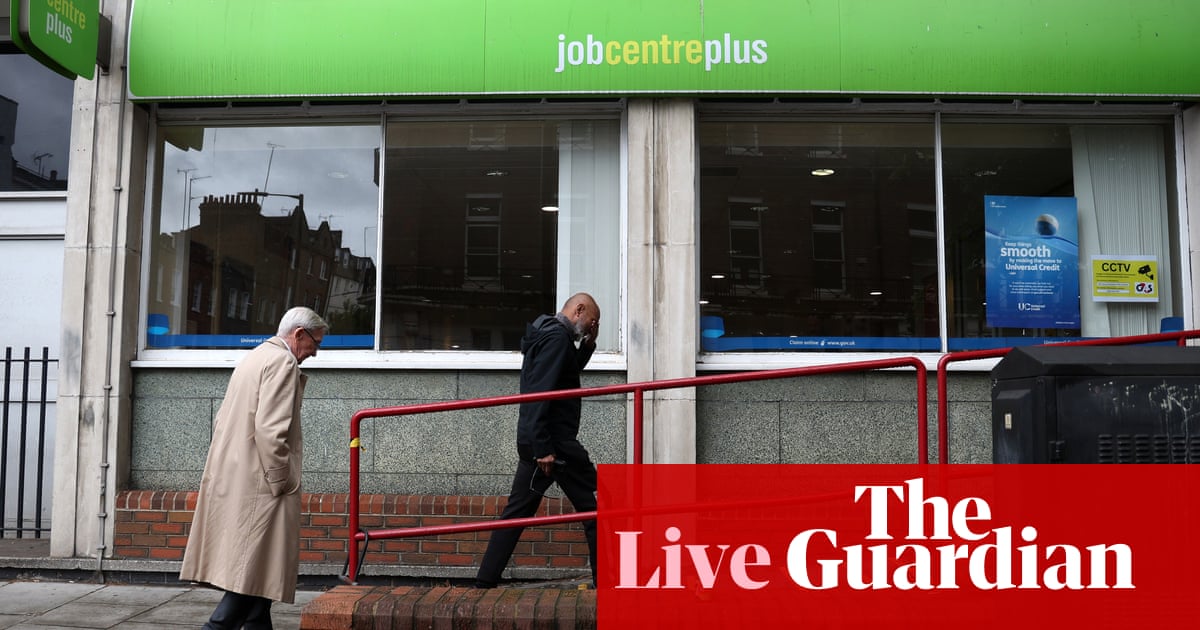Key events
Introduction: UK wage growth slows; global chip stocks fall amid growing tensions between US, China and Taiwan
Good morning, and welcome to our rolling coverage of business, the financial markets and the world economy.
The UK job market has continued to cool, with wage growth slowing to a two-year low while the unemployment rate remained at 4.4%, according to the latest official labour market figures.
Average earnings growth slowed to 5.7% between March and May from 5.9% in the three months to April, said the Office for National Statistics. Both regular wages, and earnings including bonuses, grew at an annual rate of 5.7%.
Regular wage growth was last lower than this in the three months to August 2022, while total wage growth was last lower in the three months to January.
The figures are closely watched by the Bank of England, which next meets on 1 August. Following higher-than-expected inflation yesterday, financial markets scaled back expectations of a rate cut at that meeting, putting the probability at 35%. This has just risen to 40% after the labour market data.
In the public sector, wage growth remained strong at 6.4% for the third consecutive period while in the private sector, it was 5.6%.
The finance and business services sector saw the largest annual regular growth rate at 6.7%; while the construction sector saw the smallest rate at 3%, the same as the previous three-month period.
Liz McKeown, the ONS director of economic statistics, said:
We continue to see overall some signs of a cooling in the labour market, with the growth in the number of employees on the payroll weakening over the medium term and unemployment gradually increasing.
Earnings growth in cash terms, while remaining relatively strong, is showing signs of slowing again. However, with inflation falling, in real terms it is at its highest rate in over two and a half years.
Annual growth in real terms – adjusted for inflation – for regular pay was 2.5% in March to May, and for total pay was 2.2%.
The UK’s unemployment rate stayed at 4.4% in the three months to May. The number of job vacancies fell by 30,000, led by dwindling demand in retail and hospitality amid a continued slowdown in hiring across the economy.
We’ve published the latest UK labour market figures.
Headline indicators for the UK labour market for March to May 2024 show:
– employment was 74.4%
– unemployment was 4.4%
– economic inactivity was 22.1%Read Labour market overview ➡️ https://t.co/MdXZmfY8cb pic.twitter.com/gjSFyoyNgv
— Office for National Statistics (ONS) (@ONS) July 18, 2024
Global chip stocks tumbled, with the Dutch company ASML, US firm Nvidia and Taiwan’s TSMC hit by reports of tighter export restrictions from the US and remarks from Donald Trump.
Bloomberg reported yesterday that the Biden administration is considering using the most severe trade restrictions available to clamp down on companies exporting their critical chipmaking equipment to China.
Washington’s foreign direct product rule (FDPR) allows the US to put controls on foreign-made products if they use a small amount of American technology. This can affect non-US companies.
Trump, the former US president who is running for the presidency again, said Taiwan should pay the US for defence, in an interview with Bloomberg Businessweek. He also claimed Taiwan took “about 100%” of America’s semiconductor business.
ASML shares tumbled by 11% despite better-than-expected sales and profits, with 49% of its sales coming from China. Tokyo Electron shares in Japan closed nearly 7.5% lower and TSMC dropped by 2.4%. The Cambridge-based chipmaker Arm closed down by 10%, along with US firms AMD and Marvell, while Qualcomm and Broadcom fell by around 8% and Nvidia lost 6.6% on Wall Street. This drove the tech-heavy Nasdaq lower by 2.77%, while the S&P 500 lost 1.4%.
The Agenda
-
1.15pm BST: European Central Bank interest rate decision
-
1.30pm BST: US Initial jobless claims for week of 13 July
-
1.45pm BST: ECB press conference
-
3.15pm BST: ECB president Christine Lagarde speech












